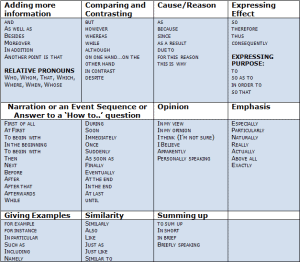How To Do IELTS Speaking Part 1
If you know nothing about the IELTS Speaking Test then read this IELTS Speaking Test Overview first. For everyone else here is how to do the IELTS Speaking Test Part 1:
How To Get A Head Start!
Firstly, we do not know what questions you will be asked in the test but there are two things we can be sure about!
1. We know what topics are likely to be covered in part 1. They are likely to include:
Your studies or work, where you live, daily routine, family and friends, hobbies, transport, weather, childhood and neighbours.
2. We know what the examiners want to hear good:
vocabulary, grammar, fluency and pronunciation.
Focusing on these points will help you improve your speaking in the quickest possible time! The rest of this article explains how you can do this.
Vast Vocabulary!
You need to have a wide enough vocabulary range to be able to handle the topics listed above comfortably. One way to help you do this is to produce a mind map like the one below.
You could do this for each topic you are likely to be asked about. You should add as much different vocabulary and synonyms as you can to your mind map.

Challenge Yourself!
Look at your mind map and try and talk about each different topic for 1 minute and then move onto the next topic.
If you can’t get a native speaker to listen to you and correct you, record yourself and then listen back yourself, are there any obvious mistakes you are making? Do you pause a lot to think of vocabulary? If so repeating this task often will help you.
Fantastic Fluency!
For a band 7.0 IELTS examiners want to see that you can speak at lengthwithout noticeable effort, make sense and use a range of connectives.
One way to show you can do this is by always expanding on your answers. For example:
Examiner: Tell me about your family?
Student 1: I have a mum, dad and a sister.
OK, this answer whilst not grammatically wrong does not show you being fluent. Let’s try again:
Examiner: Tell me about your family?
Student 2: I have a mum, dad and a sister. My sister is younger than me and is called Mary. My dad’s a salesman and has to travel a lot for work, but my mum is always at home, her cooking is great!
This second answer is going to impress the examiner much more. It shows you are willing and able to speak at length.
You can expand your answers by using words like: however, even though, although, therefore, what’s more, for instance and nevertheless.
These words are called linking words, discourse, markers or connectives. They allow your speech to flow naturally. Here’s a link/chart of more linking words useful for speaking at length:

WARNING! Do not keep repeating the same one or two connectives like ‘and’ or ‘also’, instead use a range of different connectives.
Top Tip To Improve Fluency!
Do not translate into and then out of your native language!
If you do this, you first hear the English word then translate it into your own language, think in your own language what you want to say, translate this back to English and then finally speak.
Not surprisingly this takes time and delays your speech making you sound unnatural and definitely NOT fluent!
You need to think and speak in English, this takes time to learn how to do, but is the only way you will be able to speak fluently.
Great Grammar!
A lot of the questions in IELTS Speaking Part 1 will be simple questions about you. This is likely to mean that present simple is used a lot.
There are some common mistakes with this tense that it is important for you to avoid. Here are my top three:









2 Comments
srimali priyadarshani
November 13, 2019I am an Architect and I also like to improve my vocabulary.
bharti ahlani
December 12, 2017i need to improve my vocabulary because i m trying for a teaching job.